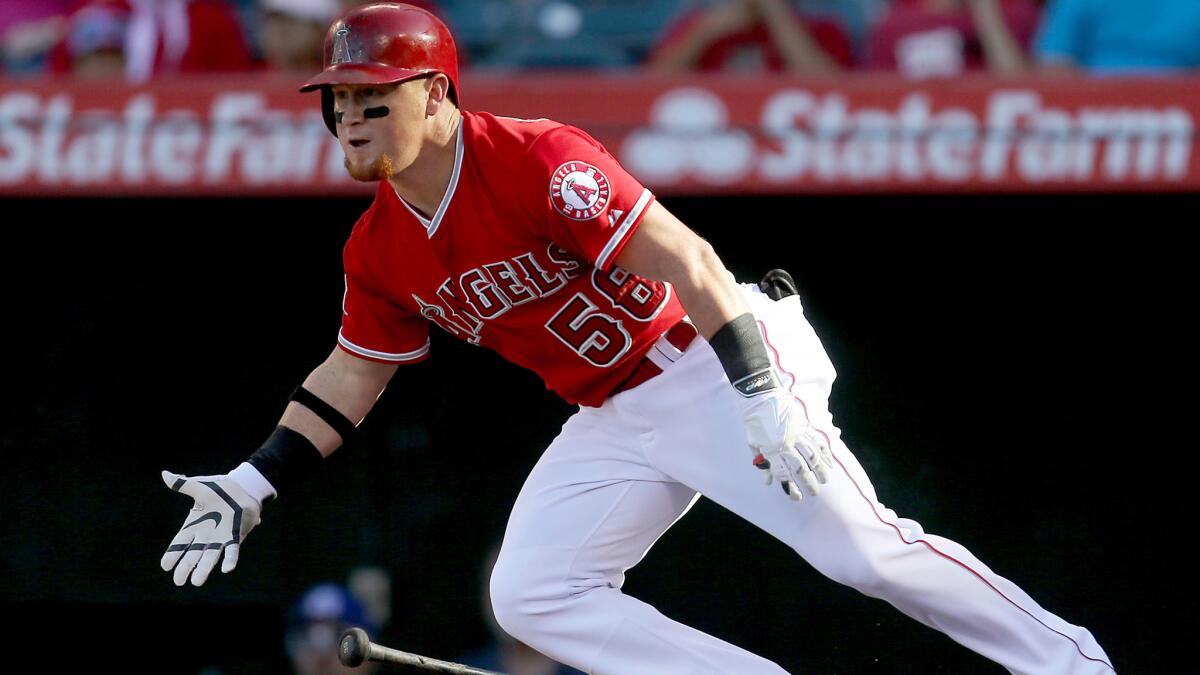By any measure, Angels’ Kole Calhoun has had a solid baseball career

Kole Calhoun’s career numbers of a .267 average, .323 on-base percentage and .435 slugging percentage combined are above average for a major leaguer.
- Share via
In the spring of 2008, Pat Murphy worried about the state of his prominent baseball program at Arizona State. Too many of the players he and his coaching staff recruited, he found, were wonderful athletes — “Tarzans,” he said — who could not actually hit.
“Can’t we find some short, red-headed, short-armed guy?” he asked in a staff meeting. “I’ve never seen a short, red-headed, short-armed guy playing that can’t hit.”
“They all laughed, of course,” Murphy recalled. “It was tongue-in-cheek. But my point was that sometimes the guys that look like major leaguers aren’t, and the guys who are don’t.”
The next day, one of his assistants posted Kole Calhoun’s head shot on the wall outside his office.
“He’s not an inch over 5-8, I promise,” said the assistant, Andy Stankiewicz, who had been listed at 5 feet 9 during a seven-year big league career.
Murphy offered Calhoun a scholarship. In the eight years since, Calhoun’s continued success has challenged the industry’s approach to player evaluation and scouting. Now the Angels’ 28-year-old right fielder and perhaps their second best player, he has hit well wherever he has played for a dozen years running: high school, junior college, summer ball, major college, the low minors, the upper minors, and, for the last three years, the major leagues.
But because he is short and stout, not long and lithe, he received most of those opportunities far later than his numbers foretold.
And hitting is not his only skill. Since his June 2012 big league debut, Calhoun has proven he possesses above-average power, above-average speed, and above-average arm strength. But all of those tools are just that, above-average; none are among baseball’s best, adding a layer to his struggle to get noticed.
Scouts look for standout tools. He has none. Scouts look for athletic builds. When Calhoun arrived in Eau Claire, Wis., to play summer baseball in 2007, “he was a fat, red-headed, little roly-poly,” said Dale Varsho, the longtime Eau Claire Express coach.
Even out of shape, Calhoun could hit. He won Northwoods League co-most valuable player honors and promised Varsho he’d be back the next summer if he didn’t get drafted. Varsho saved him a room in his house.
They became close, their friendship built on a bond of mutual admiration. Varsho came to see Calhoun when the Angels were in Minneapolis last month, where Calhoun attended Varsho’s daughter’s AAU basketball game, and again in Milwaukee this week.
Their relationship was tested the night of the Northwoods League’s All-Star game in 2008, Calhoun’s second Midwest summer. Celebrations turned rowdy; Calhoun was arrested for disorderly conduct in the early morning at a Madison, Wis., hotel.
Citing its zero-tolerance policy for alcohol, the league barred Calhoun from the season’s final three weeks of the summer season. Varsho bailed him out of jail and advised him to call Murphy.
“It gives me chills now, thinking about it,” Murphy said. “My message to him was clear: Take full accountability for this. That was it. He did it. It was never an issue again.”
Said Calhoun: “It was a wake-up call. I was young and dumb and playing ball. And then the real world hits you.”
Said Varsho: “I think that hit home for him, understanding that, you know, you can’t keep doing this. He grew up. And then he went to ASU and kicked it into gear.”
Murphy honored his scholarship, and Calhoun won a starting position, got stronger, hit .313 with 12 home runs and starred in the College World Series for the nation’s No. 3 team. No major league team bit in the June draft.
“He was getting more and more mad that kids he knew he was better than got drafted,” Varsho said. “And he didn’t get a sniff.”
Calhoun went back to Eau Claire, played the whole summer, and returned to school. He hit 17 home runs with a .478 on-base percentage, yet remained uncertain he’d be selected.
“I thought I had the numbers to get an opportunity,” he said. “But I thought that for years before that.”
The Angels picked him in the eighth round, 264th overall. Two years later, he was in the major leagues. A year after that, he had solidified a starting spot. He has outproduced all but five first-round picks from that draft.
“I don’t know what all of professional baseball was thinking,” said Eddie Bane, then the Angels’ scouting director. “We were just dumb.”
Calhoun is again hitting well this season, his average at .304. His career offensive numbers — a .267 average, .323 on-base percentage, and .435 slugging percentage — do not stand out. But, in this era, they are altogether about 15% better than average. And those who’ve coached him maintain he adds value in other ways.
“His competitive nature comes to define your team,” Murphy said.
It is a nature formed by nurture, necessitated by a long-standing collective lack of respect from the baseball establishment. If Calhoun were not as competitive, not as confident, he would not have gotten here.
“He’s not a showoff, not a hot dog,” Bane said. “He’s just got that air about him, that he’s better than you, and he’ll show you.”
Follow Pedro Moura on Twitter: @pedromoura
Go beyond the scoreboard
Get the latest on L.A.'s teams in the daily Sports Report newsletter.
You may occasionally receive promotional content from the Los Angeles Times.




